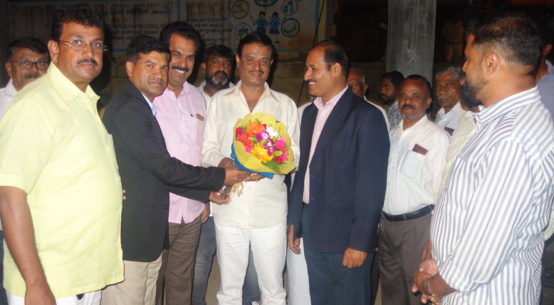
[vc_row][vc_column][vc_column_text]
 A large groundswell of resentment is brewing among small plastic manufacturers in Peenya who are facing needless harassment at the hands of some over-zealous officials. PIA has received complaints about officials barging into plastic manufacturing units and seizing non-banned items and levying huge penalties on flimsy grounds without giving any notice and Mahazar reports.
A large groundswell of resentment is brewing among small plastic manufacturers in Peenya who are facing needless harassment at the hands of some over-zealous officials. PIA has received complaints about officials barging into plastic manufacturing units and seizing non-banned items and levying huge penalties on flimsy grounds without giving any notice and Mahazar reports.
“We strongly protest against such harassment of our entrepreneurs in Peenya,” declared a combative R. Krishnamurthy, President, PIA. “The ban on plastic is being used as a tool to indulge in corruption by mischievous officials. PIA will take this issue at the appropriate levels to ensure justice to our entrepreneurs.”
As a follow-up measure, a delegation of Industry Associations comprising PIA, KASSIA, FKCCI, and others called on Sri T.M. Vijay Bhaskar, IAS, Additional Chief Secretary, Forest, Ecology & Environment to discuss the issues related to Plastic ban in Karnataka, in particular, the harassment faced by small scale industries and plastic manufacturers at the hands of over-zealous officials.
Pursuant to the intervention by PIA and other industry bodies, the Additional Chief Secretary, Forest, Ecology & Environment promised to issue suitable directions to the officials and ensure that no innocent entrepreneurs are made to suffer.
Incidentally, after the protest by PIA and others, the Karnataka government’s blanket ban on plastics has now come under the scrutiny of the Centre and is being questioned at the National Green Tribunal (NGT).
Though the NGT has dismissed the petitions which questioned the total ban, it has nonetheless given room for the Centre to curtail the total ban if it is in violation of the Environment Protection Act and the Plastic Waste Management (PWM) rules of 2016, passed by the Centre.
The Centre and other stakeholders have raised concerns over Karnataka’s blanket ban on plastics irrespective of the difference in thickness. They have argued that while plastic is a versatile material, playing major role in delivering and sustaining quality, comfort etc., it also provides safety of modern life. The NGT has observed that the Union Ministry of Chemicals and Fertilizers, “…in effect made a case that the plastic materials should be allowed and the rules framed by the Government of India regarding regulation of plastic materials must be scrupulously followed.”
On January 13, while hearing the case between various plastic manufacturers and the state of Karnataka and others, the NGT noted that the Department of Chemicals and Petro-chemicals under the Union Ministry of Chemicals and Fertilizers has sought for avoiding a blanket ban on the manufacture, supply, sale and use of plastics.
Sharing the Centre’s concern, another of the respondent, the Central Institute of Plastics Engineering and Technology (CIPET) echoed the view that the blanket ban was not correct. In its submission, the CIPET said “…complete ban of manufacture, use and sale of plastic carry bags and other items is against the public policy.”
During the hearing, the State government argued that the environment protection was unmanageable without the plastic ban and that it formed a sizeable amount of municipal solid waste (MSW) in the state.
Taking all these into consideration, the NGT exposed a possible loophole in the total ban on plastic by Karnataka. Citing that the states were only delegatees of power granted to them by the Centre in issues concerning the Environment Protection Act, the NGT said: “…if the central government is of the view that either there is excess of the exercise of the powers or the powers are in violation of rules, it is always open to the central government to pass appropriate orders under section 5 of the EP Act.”
As per the rules fixed by the Centre under the Plastic Waste (Management & Handling) Rules, 2016, the manufacture, stock, distribution and sale of carry bags made of virgin or re-cycled or compostable plastic with a thickness below 50 microns is prohibited.
The Karnataka government in its notification on March 11, 2016 had barred all such manufacture, supply, sale and use in the state, without exception to the thickness of the plastic of 40 or 50 microns and below. The only exception given by the state was for plastic which was for export purpose, an integral part of packaging goods, used by forests and horticulture department and for milk and milk products.
[/vc_column_text][/vc_column][/vc_row]


